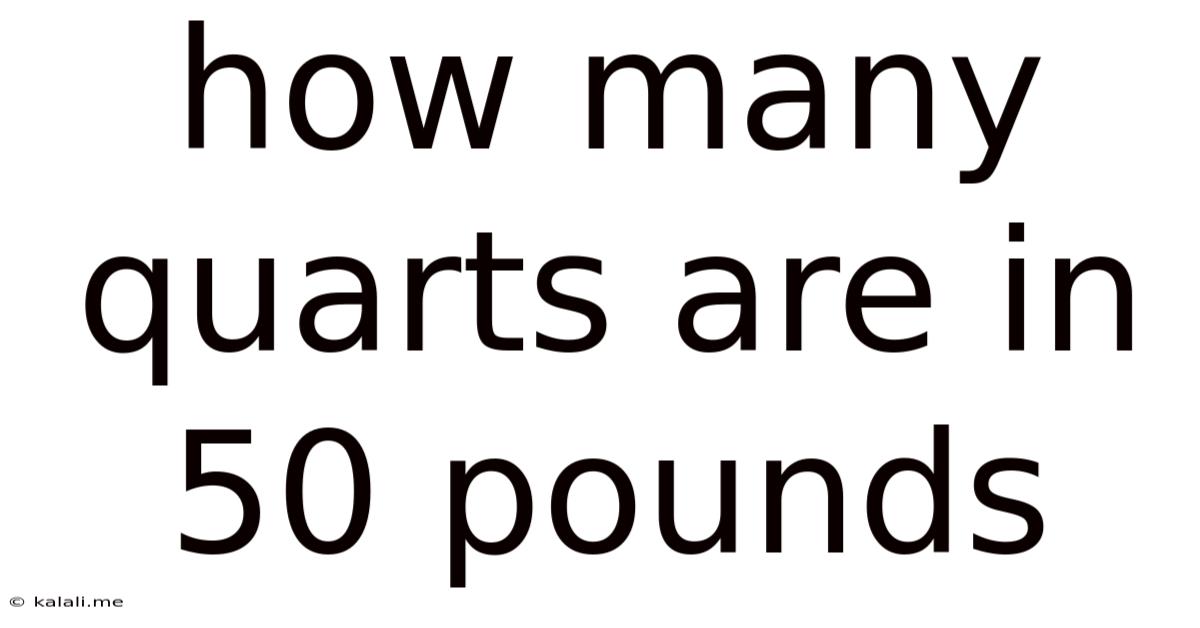How Many Quarts Are In 50 Pounds
Kalali
Jul 31, 2025 · 4 min read

Table of Contents
How Many Quarts Are in 50 Pounds? A Comprehensive Guide to Volume and Weight Conversions
Understanding the relationship between weight (pounds) and volume (quarts) is crucial in various applications, from cooking and baking to industrial processes and even scientific experiments. This seemingly simple question – "How many quarts are in 50 pounds?" – reveals a critical aspect of measurement: the importance of density. There's no single answer because different substances have different densities. This article will delve deep into this concept, providing you with the tools and knowledge to accurately perform these conversions for a variety of materials.
Understanding Density: The Key to the Conversion
Before we can answer the question, we need to grasp the concept of density. Density is the mass of a substance per unit volume. It's typically expressed in units like grams per cubic centimeter (g/cm³), kilograms per liter (kg/L), or, in our case, pounds per quart (lb/qt). The density of a substance determines how much of it will fit into a given volume. For example, a quart of water weighs considerably less than a quart of mercury because mercury is much denser.
The Variable Nature of Density: Why There's No Single Answer
The critical factor in converting pounds to quarts is the density of the material in question. 50 pounds of feathers will occupy a vastly larger volume than 50 pounds of lead. To illustrate:
- Water: Water has a density of approximately 8.34 pounds per US gallon. Since there are 4 quarts in a gallon, the density of water is roughly 2.085 pounds per quart.
- Milk: Milk has a slightly higher density than water, generally around 2.15 pounds per quart.
- Oil: The density of oil varies significantly depending on the type of oil. Cooking oils generally have a density slightly less than water.
- Honey: Honey is considerably denser than water.
This variation in density means that 50 pounds of one substance will occupy a completely different volume than 50 pounds of another. There is no universal conversion factor from pounds to quarts.
Calculations: Determining Quarts from Pounds for Specific Substances
To calculate the volume (in quarts) of a substance given its weight (in pounds), we need to know its density. The formula is:
Volume (quarts) = Weight (pounds) / Density (pounds/quart)
Let's work through some examples:
Example 1: Water
- Weight: 50 pounds
- Density: 2.085 pounds/quart (approximate)
- Volume: 50 pounds / 2.085 pounds/quart ≈ 23.98 quarts
Therefore, 50 pounds of water would occupy approximately 24 quarts.
Example 2: Milk
- Weight: 50 pounds
- Density: 2.15 pounds/quart (approximate)
- Volume: 50 pounds / 2.15 pounds/quart ≈ 23.26 quarts
50 pounds of milk would occupy approximately 23 quarts.
Example 3: A Hypothetical Substance
Let's consider a substance with a density of 5 pounds per quart.
- Weight: 50 pounds
- Density: 5 pounds/quart
- Volume: 50 pounds / 5 pounds/quart = 10 quarts
This demonstrates how density significantly impacts the volume.
Beyond Simple Conversions: Considering Temperature and Pressure
The density of a substance can also be affected by temperature and pressure. For example, the density of water changes slightly with temperature. This means that precise conversions require considering these environmental factors, especially for scientific or industrial applications where high accuracy is paramount. For everyday purposes, however, these variations are often negligible.
Practical Applications: Where These Conversions Matter
Accurate conversions between weight and volume are essential in various fields:
- Cooking and Baking: Recipes often specify ingredients in either weight or volume. Knowing the density allows for accurate substitutions.
- Industrial Processes: Many industrial processes involve precise measurements of liquids and solids. Accurate conversions are crucial for efficient production.
- Shipping and Logistics: Calculating shipping costs often involves knowing both the weight and volume of goods. This is particularly important for determining freight charges.
- Scientific Experiments: Precise measurements are critical in scientific experiments. Understanding the relationship between weight and volume is essential for accurate results.
Finding Density Information: Resources and Methods
To perform accurate conversions, you need to find the density of the substance you're working with. Here are some resources:
- Online Databases: Numerous online databases provide density information for various substances. A simple search using the substance name and "density" will often yield results.
- Chemistry Handbooks: Chemistry handbooks are comprehensive resources containing density data for a wide range of materials.
- Material Safety Data Sheets (MSDS): MSDS sheets, often provided by chemical manufacturers, frequently include density information.
Conclusion: The Importance of Context and Precision
The question of how many quarts are in 50 pounds highlights the critical role density plays in converting between weight and volume. Without knowing the density of the substance, it's impossible to provide a definitive answer. This article has provided you with the necessary understanding and tools to perform these conversions accurately for various materials, considering the influence of density, temperature, and pressure. Remember, always consider the context and the necessary precision when performing these conversions, ensuring accurate results for your specific application. By understanding these principles, you can confidently navigate weight and volume conversions in a variety of situations.
Latest Posts
Latest Posts
-
Average Height Of A 10 Year Old Boy
Jul 31, 2025
-
What Figurative Language Is Is Your Refrigerator Running
Jul 31, 2025
-
How Many Ounces In A Cup Of Sugar
Jul 31, 2025
-
How Long Did It Take To Walk Around Jericho Once
Jul 31, 2025
-
What Is A 14 Out Of 19
Jul 31, 2025
Related Post
Thank you for visiting our website which covers about How Many Quarts Are In 50 Pounds . We hope the information provided has been useful to you. Feel free to contact us if you have any questions or need further assistance. See you next time and don't miss to bookmark.